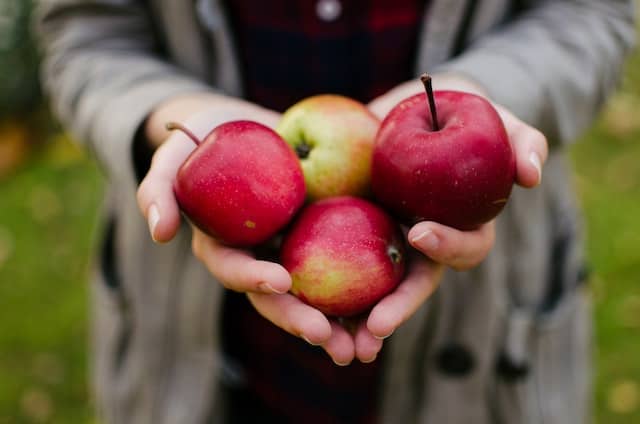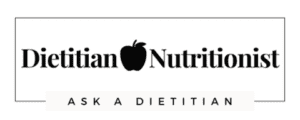If you have heard that an apple a day keeps the doctor away, you might wonder what is so special about this particular fruit. Is that even true? Or did your mom just tell you that as a kid so that you would eat your apple slices?
You can eat up to 1 to 3 apples per day to be healthy. Apples are a great source of fiber, vitamins, minerals and phytochemicals, and are a nutritious fruit that you can include regularly in your diet! Of course, they do not contain all of the nutrients that your body needs each day, so I recommend choosing a variety of fruits each day to enjoy.
Read on for more information about the nutrition of apples, benefits of including them in your diet, best ways to eat apples, storage tips, and risks of eating too many apples.

Are Apples Healthy?
Apples are one of the most common fruits eaten by adults, children, and teenagers alike. In fact, apples are one of the top 3 highest produced fruits in the world. Thankfully, their nutrition lives up to their hype!
Fruit is an important part of a healthy diet and while apples alone don’t provide all the nutrients your body needs to function, they do have a lot of important ones!
Nutrients in Apples:
Carbohydrates
Apples are a great source of natural sugars (a form of carbohydrates). Carbs provide your entire body with energy so they are extremely important. In fact, most people need at least half of their daily calories coming from carbohydrates.
Fiber
Eating fiber with meals and snacks helps you feel more full and satisfied with your food. Fiber slows down the digestion of your carbohydrates so that you don’t have a giant spike in blood sugar and a subsequent blood sugar “crash.”
Fiber also helps to keep your gut healthy and regulated. Constipation and diarrhea can actually both happen if you aren’t consuming enough fiber. Fiber is also known as a “prebiotic,” meaning it feeds the good bacteria in your gut!
Vitamin C
Apples are an excellent source of Vitamin C, a vitamin that helps keep your immune system healthy, helps with wound healing, aids in iron absorption, and improves joint health. A medium sized apple provides about 14% of your daily Vitamin C needs.
Potassium
Potassium is an electrolyte and important mineral that helps regulate a healthy blood pressure. An apple only contains about 6% of the average person’s daily potassium needs, but by eating a balanced diet, those small sources of potassium add up.
Phytochemicals
We honestly don’t know too much about phytochemicals, but we do know that there are other compounds in some foods, like apples, that are linked to improved health and lower risk of disease.
Nutrition in Apples
Typically, one medium apple contains approximately (depending on size and type of apple):
- 95 calories
- 0 grams of fat
- 1 gram of protein
- 24 grams of carbohydrates
- 3 grams of fiber
- 0 mg of cholesterol
- 195 mg of potassium
- 8.4 mg of Vitamin C

Benefits of Eating Apples
Since apples are a very popular food across the world, there is actually a ton of research to show the benefits associated with eating them:
- Apples have been shown to help protect your heart and blood vessels and decrease your risk of cardiovascular disease.
- Eating apples has been linked to a lower diabetes risk (type 2).
- Eating apples can help improve your brain function and cognitive abilities!
- Apple intake might even be associated with better bone health.
You likely will see a lot of these benefits from eating other fruits and vegetables in general. A healthy diet with a variety of fruits and vegetables will support a healthy body and decrease risk for disease!
Can You Eat Too Many Apples?
Have you ever heard someone say that too much of a good thing can be bad? This is actually very true in the nutrition realm. If you focus on only eating a few foods, regardless of whether you consider them healthy or not, your body will miss out on the nutrients from other foods. You should eat 2 to 3 servings of fruit per day and one or two of those can be apples.
You can eat up to 1 to 3 apples per day for a healthy diet. Eating more apples can cause bowel discomfort from eating too much fiber (especially if you aren’t used to eating enough fiber, like many adults!) You could also experience blood sugar spikes and crashes, especially if you eat a few apples at once, which could lead to irritability, fatigue, and unhealthy cravings later in the day. You could also be missing other nutrients if you only fill up on apples, such as protein, calcium, and iron, which will affect your overall health. If you eat too many apples, you could also gain weight as your body stores the extra carbohydrates and calories.
If there is a day where apples are the only fruit available and you have multiple, it isn’t the end of the world. However, I encourage everyone to mix up the types of fruit they include in their diet. Your body does best with a variety of fruits and foods during the day. Include a variety of flavors, textures, and colors and you will likely be meeting your body’s needs.
The Best Way to Store Apples
It can be challenging for people to eat enough produce because it goes bad so quickly and has to be replenished more frequently. One reason that apples are such a popular fruit is that they stay fresh for quite a long time if they are stored correctly.
Apples release something called “ethylene gas” which speeds up the ripening process. However, when they are stored in the refrigerator, the colder temperatures slow down the ripening process. While apples stored on the counter might only stay good for 1-2 weeks, apples stored in the refrigerator might stay good for up to 1-2 months.
It is best to store your apples in one of the drawers of your refrigerator and away from other foods, especially other produce. The ethylene gas emitted from the apples can actually speed up the ripening of other foods in close contact!
The Best Way to Eat Apples
Is there really a best way to eat apples? Technically, when apples are processed in different ways, they do tend to lose some of the nutrients. For example, apple juice loses the fiber that is in the whole apple itself, while dried apples might lose some of their Vitamin C content and have extra sugar added.
I recommend that you eat apples in a way that is satisfying and tasty to you. The best case scenario is that you enjoy eating whole apples with the skin on. The skin of the apple actually contains a lot of the nutrition!
Whether you buy regular apples or organic apples, it is always a good idea to wash them with water before eating.
Apple Serving Suggestions
Eating a whole apple might become a little boring after a while. Here are some new ideas for healthy ways to eat apples!
- Use an apple slicer to cut apples in advance but don’t cut them all the way through- leave them attached at the bottom so that you can put a rubber band around them and keep them together until you are ready to eat them! This helps them stay fresh and prevents browning.
- Another way to have apple slices cut in advance and last longer is to put them in a container and add lemon juice. The lemon juice will slow the browning process.
- Apples are best eaten when paired with something else that has some protein in it. This will help keep your energy levels stable and your blood sugar more balanced.
- Apple slices and a cheese stick
- Apple slices and nuts
- Apple slices and beef jerky
- Apples slices and cottage cheese
- Apple slices and hard boiled eggs
- Dip apples apples in peanut butter, almond butter, cashew butter, yogurt, or cream cheese for a sweet and savory snack. You could even add a few chocolate chips, cinnamon, or honey!
- Chopped apples can be added to oatmeal with some cinnamon, protein powder, and brown sugar for a balanced and nutrient-filled breakfast.
- Add chopped apples to greek yogurt with some granola.
- Add chopped apples to pancake batter for some natural sweetness.
- Apples can even be added to smoothies!
- Do an apple tasting with friends or family where you cut up lots of different varieties of apples and have them with different dips. Let everyone vote on their favorite type of apple and the best apple and dip combo!
- Applesauce and cinnamon
Summary
Ok, so you don’t have to eat an apple every single day to be healthy. And even if you do, that still doesn’t guarantee you a life without any sickness or disease. However, in general, a higher intake of fruits and vegetables has been clearly associated with lower disease risk and better health outcomes overall.
My best advice is to eat a variety of foods from each food group every day. If you enjoy apples and want to eat them frequently, go for it, but try to include other fruits in your diet as well.
Related Posts
- Do You Need Protein Every Day?
- What Nutrients do Middle Aged Adults Need?
- What Should I Eat at the Gym?
- Best ways to lose weight and keep it off after 40
Resources
Harvard T.H. Chan. Apples. Hsph.harvard.edu.
Hendley J. 12 ways to dress up an apple (that’s not just a spoonful of peanut butter). Eatingwell.com. Published October 21, 2019.
Sementelli K. Health benefits of apples. Todaysdietitian.com. Published September 2019.
